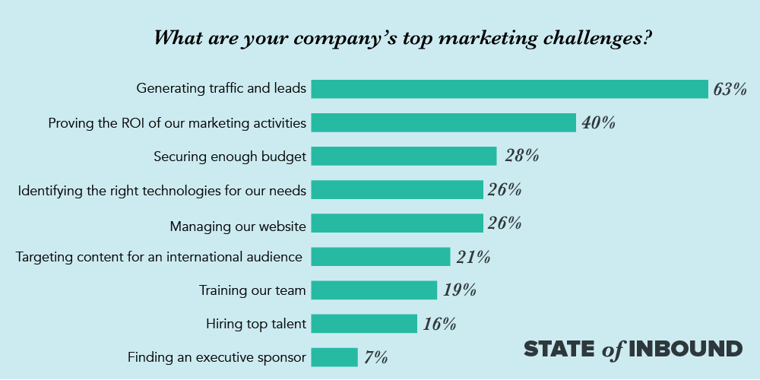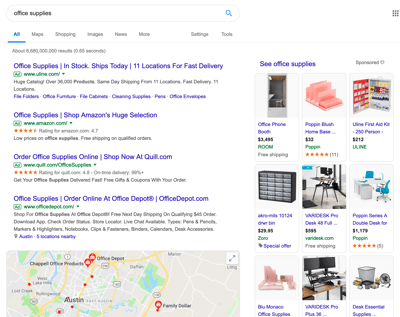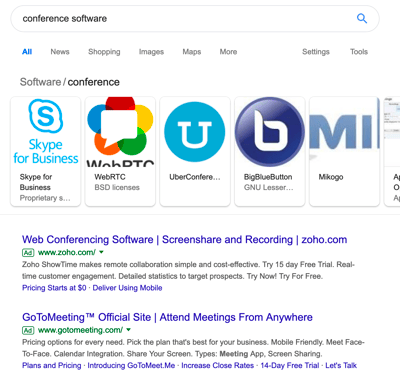
How to Solve Marketing Problems with Keyword Strategy

The No. 1 challenge marketers say they face today is generating traffic and leads. More than 62% of businesses are having trouble getting the right people to their website. With so many websites competing for the top spots in Google — both in organic and paid search — that first step of awareness feels increasingly out of reach for too many marketers. But there’s a not-so-secret weapon you can use to overcome this challenge, and many others: a keyword strategy.
 And there’s proof it can make a difference. Over the course of just one year, Fisher-Titus Medical Center increased the number of relevant keywords they ranked for by 406 percent and saw a 110 percent increase in organic traffic. As they learned, a keyword strategy has a crucial role to play in search engine optimization (SEO), but that’s not the only common marketing issue it’s useful for.
And there’s proof it can make a difference. Over the course of just one year, Fisher-Titus Medical Center increased the number of relevant keywords they ranked for by 406 percent and saw a 110 percent increase in organic traffic. As they learned, a keyword strategy has a crucial role to play in search engine optimization (SEO), but that’s not the only common marketing issue it’s useful for.
7 Problems a Keyword Strategy Helps Solve
Most businesses have been doing keyword research for years to support their SEO and PPC (pay-per-click) efforts, but a keyword strategy is worth developing in its own right. Here are a number of problems a good keyword strategy can help your team solve.
1. You don’t know what your audience is thinking.
Part of being a good marketer is getting inside the mind of your audience. To create content and ads that appeal to what your target audience cares about, you need to learn what matters to them and what kind of messaging they respond to.
With keyword research, you dig into the phrases people are commonly Googling and the terms they frequently use on social media. A keyword strategy is an exercise of learning what topics your audience cares about, the language they use to describe them, and then putting that information to good use.
An analysis of common keywords can also help your team gain a better understanding of your audience’s intent at different moments and how to use that knowledge in your content strategy. Your audience members don’t all fall into the same category — you have current customers, warm leads that already know about your business and products, and cold leads who are hearing about you for the first time. It’s worth understanding the language, topics and questions these people are using so you can better target your strategy to reach them with the right message at the right time.
2. You struggle to come up with relevant content topic ideas.
The longer a company does content marketing, the harder it is to continue coming up with topics relevant and useful to your target audience. And if your team is brainstorming in a vacuum, at best, you’re coming up with topics you only guess are worthwhile to your audience, when what you really want is topics that you know they care about.
A keyword strategy will help you uncover topics your audience is thinking, talking, and wanting more information about. It can help you identify the gaps in your current content. And your keyword research will help you assign priority levels based on the topics your audience cares about most.
3. You’re not sure how your marketing compares to your competitors.
Your competitors are trying (and in some cases, succeeding) to reach the same audience you are. This means there’s a good chance potential customers who encounter your marketing are also seeing ads or content from your competitors. That influences how they view what you have to say.
A competitor analysis is a good way to both see what kind of messaging your audience is seeing from competitors and to get new ideas for keywords you can target in your own strategy. Seeing what keywords your competitors target in their SEO and PPC efforts is an important part of any analysis and a good way to round out your keyword strategy with new ideas.
4. The search engine results page (SERP) is evolving, and you don’t know how to keep up.
For years, SEO professionals have been watching the SERPs change and evolve — and from the perspective of brands, not for the better. Instead of a few ads at the top and a list of 10 links with descriptions below them, for many types of searches, the SERP is taken over by a mix of rich snippets and visual ads.


While that often means links to business pages get pushed further down (unless you’re paying for one of those top spots with PPC), it’s not all bad news for brands. Part of good SEO is now learning how to grab the rich snippets for relevant searches to increase your visibility to the people searching.
To accomplish this, spend time conducting SERP research to see what types of results show up for searches you want to target. You need to know what keywords to search for, and a good keyword strategy helps you better identify the rich snippets to target in your SEO campaigns.
5. You spend too much on PPC for too little results.
The keywords you target in a pay-per-click campaign have a direct relationship with how much you spend and the quality of the results you get. For a worthwhile return on investment (ROI) from your PPC campaigns, you have to find the keywords that get the most relevant clicks for the cost.
If your PPC campaigns cost too much and don’t result in enough conversions to make the price worth it, an analysis of your keywords is in order. Your keyword strategy will both help you figure out the best keywords to target in your PPC ads based on relevance, audience intent, and cost, and help you tie your PPC ads back to your other marketing efforts for better holistic results.
6. You’re worried your audience can’t find you on social media.
While SEO and PPC get the most attention in conversations about keywords, they have an important role to play in social media marketing as well. Successful social listening involves tracking keywords and hashtags across social platforms to identify relevant conversations your audience is having.
Keywords can help you find the people talking about your industry, which presents opportunities for joining those conversations and increasing your visibility. But you have to know what to look for and what language to track. A keyword strategy doesn’t just help you strengthen your content, PPC and SEO strategies. It also helps you find your audience on social and identify new opportunities to engage your communities there.
7. You have a hard time finding link-building opportunities.
Link building is both the hardest part of SEO and one of the most important. Before you can earn new links, you have to identify relevant websites that might be inclined to link to you. How do you do that? You look for websites that use keywords relevant to your brand.
Most websites that regularly use the phrases included in your keyword strategy are good targets for your link-building efforts. That’s doubly true if they use your keywords as anchor text for outbound links in their articles. A keyword strategy is, therefore, a crucial component in creating a link-building plan that targets relevant websites.
How to Create a Keyword Strategy
You will only get as much out of your keyword strategy as the time and research you put into it. Here are the main steps you need to take to create a strong keyword strategy.
1. Establish your goals.
Since your keyword strategy will have an influence on your different digital marketing channels, bring your full marketing team into this step. Get input from your social, content, PPC and SEO teams when clarifying your main goals to ensure your strategy will be holistic.
But in addition to thinking about all your different departments, don’t forget to focus on your customers. The goal of a keyword strategy is to align your marketing efforts around the keywords your customers are searching for, so they need to be top of mind.
2. Decide what keyword research tools to use.
Keyword research is much easier when you have the right tools, and there are a number of different tools, like SEMrush, that can help boost your keyword strategy. Keyword research products provide insights into:
- How often people search for common phrases
- How competitive specific keywords are for PPC and SEO
- Where your website stands now in search rankings for target keywords
- What keywords people commonly use on social media
- What keywords your competitors are targeting
Those insights will guide you in developing a comprehensive and effective keyword strategy.
3. Develop your keyword list.
The next step in your keyword strategy is developing a thorough keyword list. To start putting your list together, work with your team to brainstorm a list of all the relevant keywords you can think of. Make sure you include both keywords that refer to your main products and services, as well as other related keywords you want to rank for. This list is your starting point.
Use your keyword research tools first to fill in the details for your starter list of keywords, such as search volume, competition level and PPC cost. Then use them to supplement your keyword list with new ideas, as well. To further add to the list, use social listening and competitor research to learn what keywords and conversations are being used in your larger industry.
4. Assign your keywords priority levels for each channel.
You’ll likely end up with a long list of keywords in Step 3, and now you want to organize what you have so you can strategically put them to use. Assign your keywords priority levels based on popularity, competition, and relevance.
Your priority levels for different keywords will vary for your different channels. To determine your top priority keywords for PPC, for instance, you need to think carefully about how the cost-per-click relates to the keyword’s relevance and intent. And a keyword that’s high-priority in your social plan may have less importance to SEO because of what the SERP looks like.
Make sure you think about your customers in this step. Consider how they spend their time on each channel and imagine what they’re thinking about when they use each keyword in different online contexts.
5. Incorporate keywords into your holistic marketing strategy.
Marketing works better when all the different parts of it are connected. Your keyword strategy can serve as connective tissue for all your different marketing channels. The content you create based on your keyword research gives you something to promote via PPC and on your social channels. And knowing what people are talking about on social media and the keywords you want to target there will help you craft content that gives you an in into relevant conversations.
Keywords can help you make the connections between your different marketing channels and build campaigns where they all support each other.
A Keyword Strategy is Ongoing
Developing a keyword strategy isn’t something you do once and you’re done. There will be trends in what your audience talks about and the language they respond to, and you need to stay on top of them. And you can consistently use the analytics from what you’ve done already to improve your strategy moving forward. Revisit your keyword list regularly. Add to it based on new research. Re-order your priorities as needed.
Keep using keywords to better understand your audience, what they respond to, and what they care about. As long as you continue to use keywords thoughtfully and strategically, they’ll continue to help you solve your main marketing problems.




